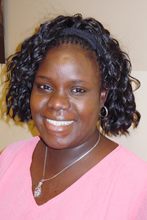
Responding to the Rise in Noncommunicable Diseases
 Are health workers around the world equipped to handle the increasing burden of noncommunicable diseases (NCDs) that are on the rise?
Are health workers around the world equipped to handle the increasing burden of noncommunicable diseases (NCDs) that are on the rise?
NCDs such as heart disease, stroke, cancer, chronic respiratory diseases, and diabetes are the leading cause of mortality in the world. According to WHO (2010) statistics, 36 million of the 57 million deaths in 2008 were due to NCDs, and the number of people, families, and communities afflicted by NCDs is increasing.
What about in sub-Saharan Africa?
The WHO statistics also show that 12 of the 15 countries with over 800 NCD deaths per 100,000 population in 2008 were in sub-Saharan Africa.
A recent sample survey conducted by several faith-based organizations, namely the Christian Health Association of Ghana, the Christian Health Association of Kenya, the Churches Health Association of Zambia, the Uganda Protestant Medical Bureau, and the Christian Health Association of Malawi, determined that health workers in this part of the world are not suitably prepared to handle the rise of NCDs.
Overwhelmingly, health workers surveyed felt that they need more appropriate training and additional staffing to address the growing number of NCDs and provide clients with appropriate health care. Common NCDs treated and managed by these health workers include diabetes, hypertension, cancer, mental illness, injuries, and asthma.
It was also reported that there are challenges with having sufficient health management information systems and human resources information systems to support the reporting of NCD cases and ensure there is an appropriate number of health workers with the correct skill mix and training to handle the NCD cases.
What can we do?
The Africa Christian Health Associations Platform’s (ACHAP) Human Resources for Health Technical Working Group came together on February 25 to discuss the study and the impact NCDs are having on the health workforce in their networks. The meeting preceded the 6th ACHAP Biennial Conference, which focused on the increasing burden of NCDs in Africa and faith-based organizations’ response, and brought together about 90 participants.
The Technical Working Group members wanted a more in-depth inquiry into the impact of NCDs on health worker workloads. They recommended more study based on specific health worker cadres so that cadre-specific interventions can be proposed to address the workload challenges and service delivery operations and processes at the health facility level.
I coordinate the Technical Working Group and represented CapacityPlus at the conference. I presented several CapacityPlus tools that can help health workers meet the growing demand of NCDs, including our:
- iHRIS software for health workforce management and planning
- Preservice Education Costing Tool to improve and scale up health worker education
- Human Resources Management Assessment Approach to identify health workforce management and leadership gaps
- eLearning courses available on the HRH Global Resource Center to strengthen health worker in-service training and effectiveness
- Integrating Family Planning and HIV/AIDS Services: Health Workforce Considerations, a technical brief on integrating services
- Holding Health Workers Accountable: Governance Approaches to Reducing Absenteeism, a technical brief that offers solutions to health worker absenteeism.
Through ACHAP, CapacityPlus supports faith-based organizations interested in applying our tools to strengthen countries’ health workforces.
It was also at this conference that the document Because Health Workers Matter was launched and disseminated to all participants. This document was developed by the Technical Working Group to help health facility leadership and faith-based organizations advocate for developing and implementing sound health workforce management policies, investing in human resources information systems, addressing health worker attraction and retention, and monitoring and evaluating progress and results.
Let’s use these tools to empower health workers to respond to NCDs!
Related items:
Photo by Adam Buzzacco


